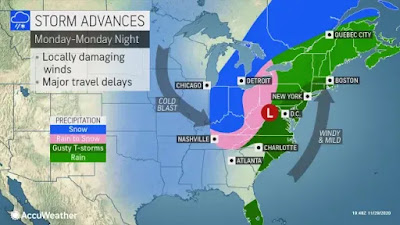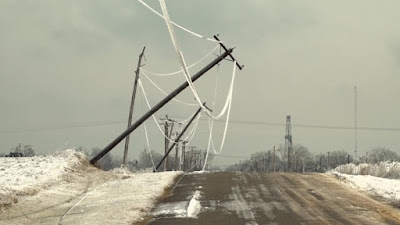 |
Day turns to night after a warm, windy and somewhat muggy Saturday in Montreal. A strong cold front crossed the St. Lawrence Valley late in the day. The front generated a line of severe thunderstorms, producing lightning, hail and wind gusts to 90km/h. This photo was taken on Ile Perrot around 5pm on Saturday, October 10. (ValleyWeather Photo)
|
Fall is well underway across southern Quebec, but with a hint of summer still around and a sprinkling of winter. October, or as I like to call it the April of fall, is a month full of contrasts and the occasional surprise or two. We often see summer warmth, thunderstorms, frost and even snow within hours of each other. The weather on Thursday afternoon as a write this update is downright summery in southern Quebec. Temperatures on brisk southwest winds, have risen into the low to mid 20s, with Montreal currently at 21C (70F), and St. Anicet, Quebec, the warmest location in Canada at 24C (76F).
This past Saturday, Montreal recorded the warmest temperature so far this October, reaching 23C (73F), but just 36 hours later, it was 0C (32F), with frost. The weekend also featured howling winds, over 90km/h, hail and heavy thunderstorms. The storms knocked out power to over 50,000 Quebec homes and businesses. The front responsible for the windy weather, also delivered much colder air. Temperatures dropped below freezing in many locations by Monday morning. The start of this week was very wet as well, with 25mm (1 inch) of rain falling on Tuesday.
Looking ahead, another cold front arrives late Thursday evening, followed by a coastal storm late Friday. The front will bring a few showers, with the coastal storm remaining far enough to our east to just produce cloudy skies for Montreal. Temperatures will drop down to more seasonable values, with daytime highs near 15C (59F) and overnight lows around 5C (41F) for Montreal. Once the coastal storm pulls off to the northeast early Saturday, clearing skies will return to the region for the balance of the weekend.
Across western Canada, much colder air is forecast to filter into southern Alberta and Saskatchewan Thursday into Friday. A storm system will move inland from the Pacific and deliver 5 to 10cm of snow to the southern portion of both provinces by late in the day Friday. For some it will be the first snow of the season, with sick roads expected.
The western snow is an early reminder that now is time for all of us to begin winterizing our home and car. The good news is that no really cold air or snow is in sight at this time for southern Quebec. But don't be lulled into a false sense of security, it is on the way.






































